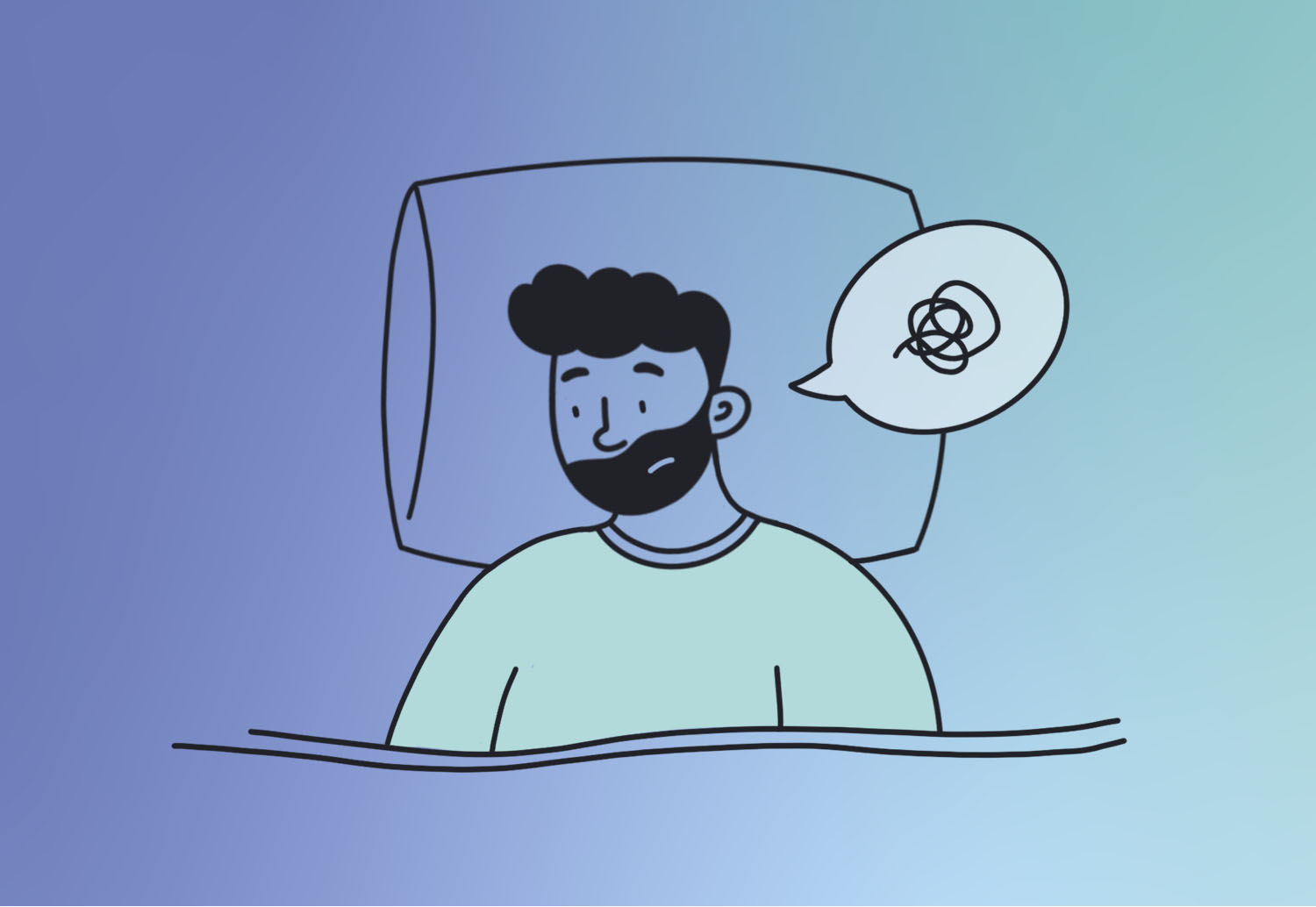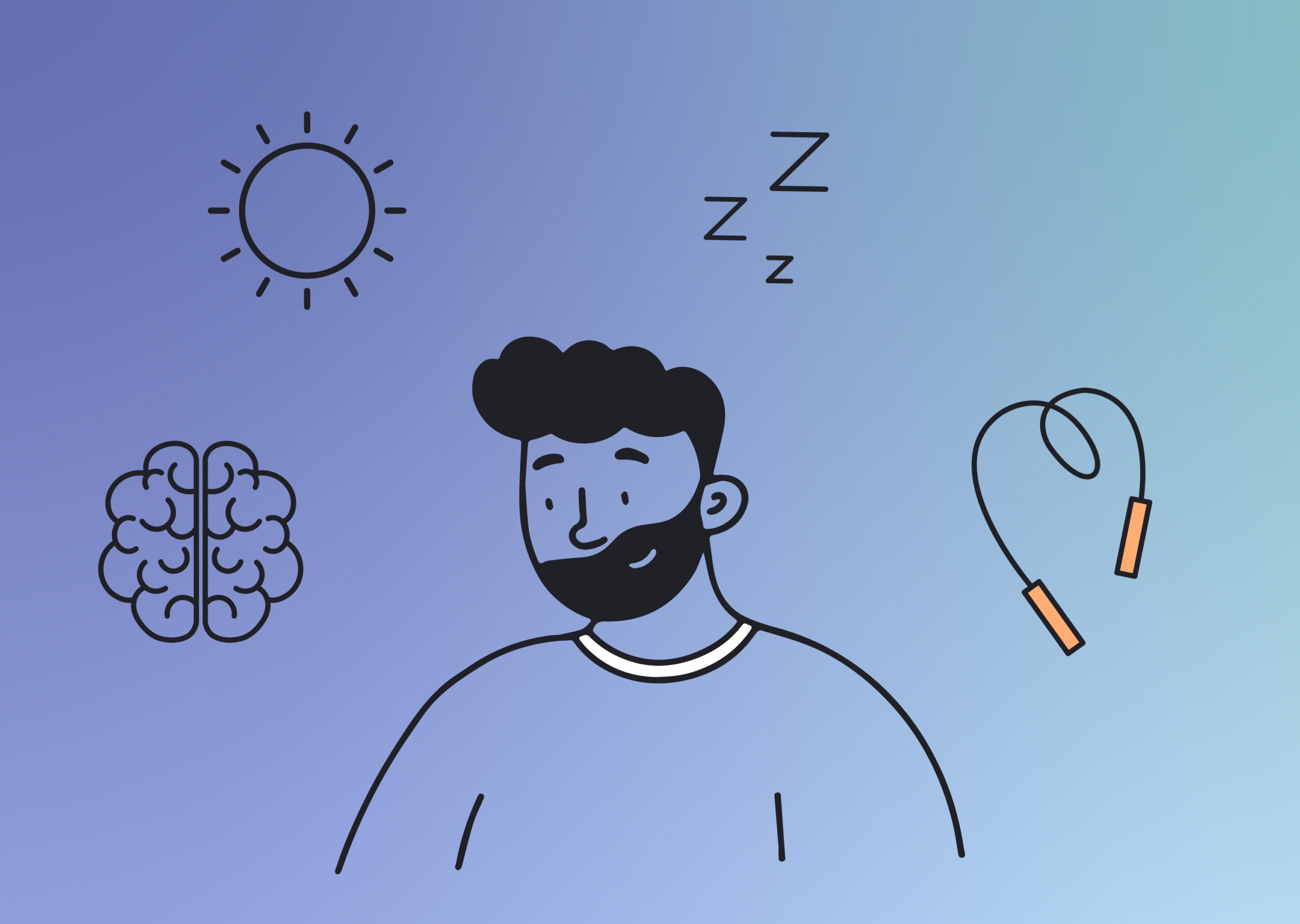Many people struggle to get out of bed in the morning. For some people, that might look like hitting the snooze button a couple of times. Others might not be able to get out of bed for a full hour or two after waking up. People in the latter camp may be suffering from dysania.
What is dysania, you might ask? While not considered a medical diagnosis, the definition of dysania is the inability to get out of bed for one or multiple hours after waking up.
People with this condition often find that it interferes with their work and/or personal lives, leading to negative consequences for their income, relationships, and mental or physical well-being.
If you ever struggle to climb out of bed after the alarm goes off, keep reading. We’ll break down some of the most common reasons people can’t get out of bed in the mornings, define dysania, clarify the differences between dysania versus clinomania (a related but distinct term), and offer a few strategies to help you sleep better and wake up feeling ready to greet the day.

What is Dysania?
Dysania is generally a symptom of another underlying issue (such as a mental or physical health condition), yet it isn’t recognized as a stand-alone medical condition or diagnosis. However, dysania can have a real impact on people’s lives.
Dysania is characterized as the inability to get out of bed. This might stem from feeling overwhelmed or experiencing symptoms of anxiety when thinking about getting out of bed, or it could be related to exhaustion. Even after people with dysania get out of bed, they may find themselves craving a return to their sheets. The condition is often chronic.
Dysania is similar to clinomania, but they’re not exactly the same thing. Clinomania is defined as the obsessive desire to remain in bed (or to remain lying down). While dysania might cause someone to lie in bed for an hour or two after their alarm goes off, people with clinomania are often inclined to stay in bed all day and might have trouble getting out of bed at all.
Like dysania, clinomania is not an official diagnosis, and it could be a symptom of a psychological or physical health condition. Both dysania and clinomania can seriously interfere with a person’s life by making it harder to maintain work commitments or social engagements.
If you find that your desire to stay in bed is interfering with your work or personal life (or your mental or physical health), don’t beat yourself up. It doesn’t mean you’re lazy; it means you’re dealing with something that should be addressed. It’s important to seek out the help of a medical and/or mental health professional.
Why Can’t I Get Out of Bed?
A lot of people struggle to get out of bed sometimes, and many factors can contribute. You might be sick of your job, run down from the constant grind of late-stage capitalism, a little under the weather, and so on. But if you find that you can’t get out of bed most mornings and it’s not an isolated incident, then it’s possible a more persistent issue might be the underlying cause.
Research suggests people with depression or bipolar disorder experience much higher levels of sleep inertia—or the transitional state between sleep and wakefulness. It’s characterized by sleepiness, impaired performance, and the desire to go back to sleep.
The duration and intensity of sleep inertia vary from person to person and depend on a variety of factors. Sometimes, people only experience sleep inertia for a few minutes before they start to feel perkier. Other times, sleep inertia’s effects can last for several hours. That latter case qualifies as dysania.
While every person is different, here are some of the most common reasons why people can’t get out of bed.
Sleep Deprivation
Most of us have experienced sleep deprivation at some point. But for anyone lucky enough not to know what we’re talking about, here’s a quick primer: Sleep deprivation occurs when a person doesn’t get enough sleep.
A person could be sleep-deprived for a single night or for a prolonged period of time. Chronic sleep deprivation is actually quite common. The CDC estimates one-third of American adults don’t obtain the minimum recommendation of seven hours of sleep per night.
People might suffer from sleep deprivation for a variety of reasons, including:
- Lifestyle factors, such as long work hours, staying out late at night, shift work, or a busy schedule that doesn’t allow for adequate down time.
- Environmental factors, such as a bedroom that’s too hot or too cold, living on a loud or brightly lit street, or an uncomfortable mattress.
- Sleep disorders, including insomnia, restless leg syndrome, narcolepsy, or sleep apnea.
No matter the cause of sleep deprivation, the outcome is almost always the same: tiredness. Other symptoms include feeling moody or irritable, forgetting things, trouble focusing, making mistakes at work, and difficulty retaining new knowledge.
Not surprisingly, another common symptom of sleep deprivation is feeling tired in the morning. This can make it harder to get out of bed.
RELATED: Everything You Need To Know About Sleep Deprivation
Sleep Disorders
Dysania can be linked with other conditions that can worsen its effects. Let’s take a closer look at some of the sleep disorders that might make it difficult to obtain restful sleep—which can, in turn, make it harder to get out of bed the next morning.
- Sleep apnea. Sleep apnea is a condition that causes people to temporarily stop breathing in their sleep. This almost always makes the sleeper wake up briefly, even if they don’t remember those wake-ups the next morning. There are a few types of sleep apnea, including Obstructive Sleep Apnea (OSA), Central Sleep Apnea, and Complex Sleep Apnea Syndrome. No matter the type, sleep apnea can make it harder to get out of bed in the mornings because you don’t wake up feeling rested.
- Insomnia. The National Blood, Heart, and Lung Institute defines insomnia as a sleep disorder that makes it harder to fall asleep, stay asleep, and/or obtain high-quality sleep. Insomnia can be short-term or chronic. In either case, it causes tiredness that can make it harder to climb out of bed when your alarm goes off.
- Hypersomnia. While insomnia creates daytime sleepiness with a clear cause (lack of sleep), hypersomnia is characterized by the inability to stay awake and alert during the day in spite of having adequate sleep at night. People with hypersomnia often sleep longer than average (10 or more hours) without feeling rested, fall asleep multiple times throughout the day, and have difficulty waking up in the morning.
- Circadian rhythm disorders. Circadian rhythm disorders arise when your body’s internal clock isn’t synced up with sleep-wake cues in your environment, such as daylight and darkness. A sleep-wake cycle that’s out of whack can make it harder to obtain enough sleep and/or quality sleep. This can lead to morning grogginess that keeps you in bed.
- Restless leg syndrome. Also known as RLS or Willis-Ekbom Disease, restless leg syndrome provokes uncomfortable sensations in the legs as well as a strong impulse to move the legs. These symptoms are often most severe when a person is resting at night—so it’s no surprise that RLS is known for impairing sleep. In turn, RLS may cause daytime sleepiness and exhaustion. And in a vicious cycle, RLS can provoke depression and anxiety—both of which can also impair sleep and make it harder to get out of bed.
Mental Illness
A number of mental health conditions can make it harder to fall or stay asleep during the night. And when you wake up tired, groggy, or otherwise out of sorts, it’s more difficult to get out of bed. Additionally, some mental health issues can cause people to dread the day ahead, which decreases motivation to climb out of the sheets.
Several mental health conditions have been linked with poorer sleep quality. These include:
-
- Depression. Depression is strongly linked with sleep issues. Per Johns Hopkins Medicine, a whopping 75 percent of people with depression have trouble falling asleep and/or staying asleep. In an unfortunate cycle, poor sleep can worsen depressive symptoms. On its own, depression can cause a lack of energy and fatigue that make it harder to find the motivation needed to start the day. Add in sleep deprivation, and it can be even more difficult to get out of bed. Additionally, some antidepressants can cause fatigue that provokes dysania.
- Anxiety. Like depression, anxiety disorders are commonly linked with sleep troubles. When anxiety is coursing through your body, it can be hard to obtain quality shut-eye. If you don’t sleep well or you’re feeling anxious about the day ahead, it’s normal to struggle with getting out of bed.
- Bipolar disorder. People with bipolar disorder often suffer from a variety of sleep issues, including insomnia, nightmares, difficulty falling or staying asleep, poor sleep quality, obstructive sleep apnea, and excessive daytime sleepiness. Any or all of these issues might make it harder to get started in the morning.
- Seasonal affective disorder. Otherwise known as SAD, seasonal affective disorder is a type of depression that occurs seasonally—usually toward the end of fall and/or during the winter. Approximately 10 million Americans experience SAD. The condition typically changes people’s moods and sleep patterns and can cause depression, lethargy, lack of motivation, and lack of sleep or disturbed sleep. These symptoms can make it harder to get out of bed in the morning—and this is often exacerbated by the darker mornings that are characteristic of winter.
Physical Health Conditions
Mental health isn’t the only health factor that can make it harder to get out of bed. A variety of physical health conditions might also contribute to dysania. These include:
-
- Chronic fatigue syndrome. Also known as CFS, chronic fatigue syndrome can make people feel extremely tired no matter how much rest they obtain. This can make it difficult to get out of bed—not only in the mornings, but all day long.
- Thyroid conditions. A number of thyroid issues can cause sleep problems that provoke sluggishness and fatigue. This might make it hard to muster up the energy needed to climb out of bed.
- Fibromyalgia. This chronic condition causes pain, mood issues, and general exhaustion—any or all of which could reduce a person’s motivation or ability to get up and move.
- Heart disease. Among other issues, heart problems can cause tiredness and sluggishness that make it harder to get started in the mornings.
- Anemia. Anemia occurs when a person’s body doesn’t have enough healthy red blood cells or the red blood cells don’t function optimally. Among other consequences, this can cause a drop in energy. Furthermore, research suggests a strong link between anemia and insomnia. So if the anemia doesn’t create morning exhaustion, the insomnia might.

Tips to Help You Get Out of Bed in the Morning
When you’re suffering from dysania, even a good night’s sleep might not resolve the issue. But obtaining quality sleep each night will serve your wellbeing in a lot of ways—and it will help you rule out a long list of factors that could be making it harder to get out of bed in the morning.
The following tips can help you sleep better at night—increasing the chances that you’ll wake up feeling refreshed the next morning.
- Get to the root cause. If you’re dealing with a physical or mental health condition that could be contributing to your dysania, it’s important to work with a doctor and/or mental health professional who can help you effectively manage the condition, reduce its symptoms, and help you sleep well each night.
- Assess your medications. If you’re taking medications for a mental or physical health condition, it’s possible they could be interfering with your sleep. Talk to your doctor about whether your medications might be contributing to your dysania. If the answer is “yes,” it’s possible your doctor might be able to work with you to change the dosage, timing, or type of the medication in question.
- Practice good sleep hygiene. Wake up and fall asleep at the same time every day (yes, even on the weekends). This conditions your body to start winding down for sleep at the same time each night. Limit caffeine and alcohol consumption in the hours leading up to bed since they can make it harder for you to fall and stay asleep. Get plenty of sunlight exposure in the morning as daytime exposure to natural light helps maintain your body’s sleep-wake cycle. Keep your bedroom quiet, dark, and cool — a calming bedroom environment significantly increases your chances of drifting off to sleep.
- Quit smoking. If you smoke nicotine, here’s another reason to quit: Smoking can interfere with your body’s ability to obtain quality Zzzs. Quitting is tough, but there are lots of good reasons to do it—and feeling well-rested in the morning is one of them.
- Implement a relaxing bedtime routine. It’s important to wind down before bed by avoiding stressors (such as work emails) and embracing calming activities such as gentle stretching, taking a bath, or reading a good book. A relaxing bedtime routine will help train your body to drift off each night.
- Invest in a quality mattress. An uncomfortable sleeping surface makes it that much harder to fall and stay asleep. If you’re not comfortable, it’ll be harder to find a relaxing sleep position, and you might be kept awake by tossing and turning. For these reasons, it’s worth investing in a quality mattress that helps you stay comfortable and supports sound sleep. Not sure where to start? Check out our top picks for the best mattress.
- Exercise regularly. Exercise is strongly linked with better sleep quality. Not only that, but it’s also been shown to improve mental health. This means it can help ease the anxiety and depression that could contribute to dysania.
How to Overcome Dysania
Craving some more strategies for how to overcome dysania? Here are some additional tips to help you get out of bed in the morning:
- Apply a cold, wet cloth to your forehead and/or turn on a fan. There’s some evidence that changing up your body temperature can help shake off sleep inertia.
- Let the light in. A darkened room supports sleep and can contribute to sluggishness, while bright light has an energizing effect and helps regulate our circadian rhythms. Use a light timer to program your lights to turn on in the morning, or ask a family member to open up the curtains in your bedroom once your alarm has gone off.
- Enlist an “accountabili-buddy.“ Ask a trusted friend, family member, partner, or coworker to reach out via call or text in the morning. Sometimes, a little encouragement can help you get over the hump (or out of the sheets).
- Plan something fun. Schedule an enjoyable activity in the morning to entice yourself out of bed. Plan to go for a stroll or cook a tasty breakfast with your partner, meet a friend for coffee, or do something else that you’ll look forward to when the alarm goes off.
- Crank some tunes. Research suggests listening to music that boosts your mood can motivate people to get going in the mornings. It doesn’t matter whether you’re partial to Bach, Metallica, or Taylor Swift; the point is to listen to music that has an uplifting effect for you. Play these tunes from your phone or from a programmable alarm clock first thing in the morning to help yourself get out of bed.
- Rethink your alarm. Do you regularly slam the snooze button as soon as your alarm goes off? Try to shake this habit by placing your alarm away from your bed on the other side of the room—that way, you’re forced to get out of bed to turn it off.
Final Thoughts
Dysania is not a medical diagnosis. It’s a term used to describe the struggle to get out of bed in the morning. People with dysania might stay in bed for an hour or two after their alarm goes off.
Dysania is often a symptom of a physical or mental health condition, such as chronic fatigue syndrome, thyroid issues, anemia, anxiety, depression, or bipolar disorder. It might also stem from sleep deprivation or sleep disorders such as sleep apnea or restless leg syndrome.
It’s important to know that people with dysania are not lazy. Instead, they’re suffering from a challenging condition that warrants medical intervention.
If you’re dealing with dysania, the tips above can help you sleep better and find more motivation to get out of bed each morning. If these at-home strategies don’t help, then it’s important to consult a medical and/or mental health professional so you can get to the root of your dysania and reclaim your mornings.

